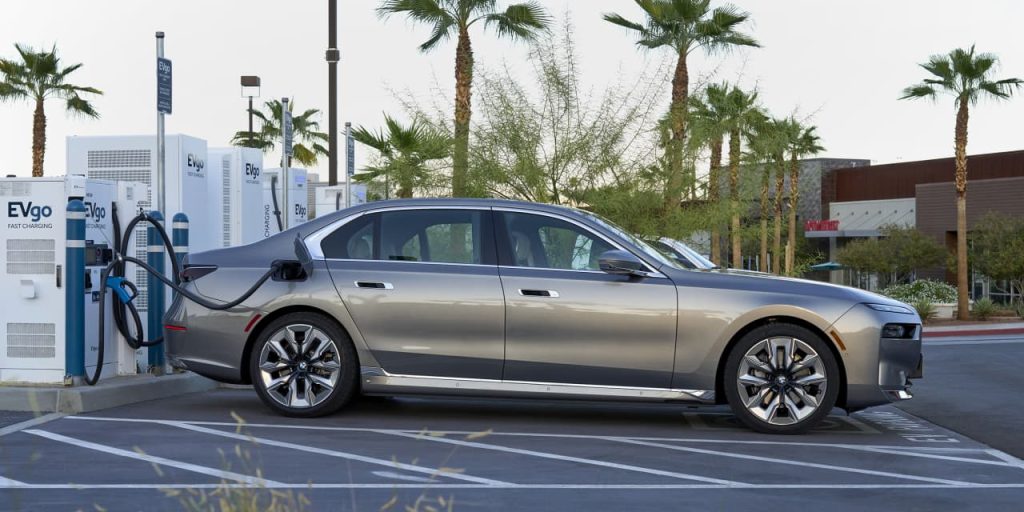BMW
boasts that it makes the “ultimate driving machine.” The company may also have the ultimate electric-vehicle stock not named
Tesla.
BMW (ticker: BMW.Germany) isn’t known for EVs. It’s a luxury auto maker that makes sleek, stylish—and pricey—sedans such as the 8 Series Gran Coupe, the M3 sports car, and the X5 Sports Activity Vehicle. But the German company has also become a stealth EV play. It delivered 93,931 all-battery electric vehicles, or BEVs, during the third quarter of 2023, more than
General Motors
(GM),
Ford Motor
(F), and
Rivian Automotive
(RIVN) combined.
| Key Data | |
|---|---|
| YTD Change | 14.3% |
| Market Value (billion) | $64.1 |
| 2024E EPS | $17.50 |
| Dividend Yield* | 8.9% |
E=estimate, * Variable
Source: FactSet
Some traditional auto makers have larger EV businesses, but few can match BMW’s sales mix. The larger
Volkswagen
(VOW.Germany), for instance, sold 210,000 BEVs during the third quarter, but that amounted to 9% of total sales. BEVs made up 15% of BMW’s total third-quarter sales, up from less than 9% the year before, a number that doesn’t include its hybrid sales. That puts the company in an enviable position. “BMW has both kept powertrain options open and been methodical about developing EVs,” says Jefferies analyst Philippe Houchois.
BMW’s EV lineup doesn’t look all that different from its traditional one. It includes all-electric versions of the i4, i5, and i7 sedans, as well as the electric iX sport utility vehicle. At their core, they’re the same cars that BMW drivers already know, just electrified. The iX xDrive50 SUV, which starts at about $90,000, has the handling, ride, and build quality that BMW drivers should expect—we took one for a drive—but it’s quieter, roomier, and goes from zero to 60 in 4.5 seconds.
Producing a great EV or two by itself doesn’t make an auto stock worth owning. But it does mean that a traditional car maker has a viable business model down the road, even if the global market for gas-powered cars is half its current size in 2030, as Wall Street, and the car companies, expect. Without the existential risk of a declining gasoline-car business, investors can evaluate BMW stock based on its fundamentals.
Not everything is perfect. Pricing, for instance, will act as a headwind. New-car prices in the U.S. are still up more than 20% from prepandemic levels, which has been helpful for operating profit margins that are expected to hit 11% at BMW in 2023, up from a historical average of 9%. Wall Street projects that margins will fall back to 9% in coming years, pressuring earnings, which could hit $17.50 a share in 2024 after peaking at almost $29 in 2022.
But declining earnings don’t have to mean a falling stock. Jefferies’ Houchois has a Buy rating and a $116 price target on the shares, up 14% from a recent $101.53. That price implies that the stock can trade at seven times his below-consensus earnings estimate of $16.20 a share in 2024. And if BMW can defend margins better than the market expects? Houchois sees potential for the stock to hit $143, up 41%.
What is the market missing? Houchois points to three things: capital efficiency, a fortress balance sheet, and a below-the-radar decision about its Chinese business.
BMW purchased a majority stake in its Chinese joint venture in 2022. Now it consolidates its Chinese business in its financial statements instead of reporting it as equity income. More important, it now fully controls its own stake in the world’s largest market for new cars and new EVs. That’s the right choice, says Houchois.
The company has also been careful with its spending. Wall Street expects BMW to invest about 6% of sales back into the business over the next three years, a little less than the rate that GM is projected to invest. That amounts to almost $30 billion, leaving an estimated $24 billion in free cash flow, with some flowing into dividends.
European auto makers typically declare a variable payout once a year, and BMW dispersed $9 a share in 2023. Based on cash flow expected in coming quarters, investors can expect something from $6 to $9 a share in 2024. At the midpoint, shares would yield 7% based on recent prices.
BMW’s balance sheet looks rock solid, too. Not including its finance arm, which makes car loans to customers eager to buy new BMWs, the company has $20 billion more cash than debt on the books, or almost a third of its market capitalization. Adjusting for cash takes the price/earnings ratio on estimated 2024 earnings to about four times. Traditional auto makers rarely trade with premium multiples, especially with the uncertainty of the EV transition under way.
That seems too low for an auto maker doing all the right things. It may take time, but you can add BMW stock to your list of EV winners.
Write to Al Root at [email protected]
Read the full article here





